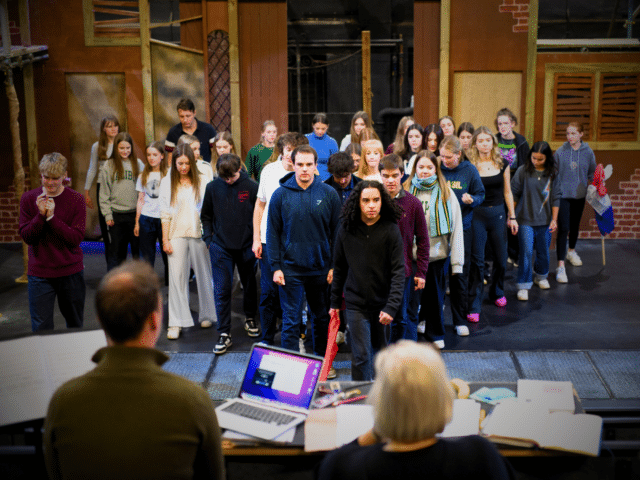The excitement is building as we rapidly approach the highly anticipated opening night of Oakham School’s production of Les Misérables. Director of Drama, Gilly Norell, takes time out of her very busy schedule to share her thoughts on one of the School’s most ambitious shows yet.

Why Les Misérables?
“Les Misérables is one of the most well-known musicals of its generation, and with good reason. As well as being phenomenal musically, it is also a brilliant tale. Some people criticise musicals for lacking a real story; you certainly cannot level that criticism at Les Mis. It is a battle for freedom and equality in the French Revolution era, but it is also a love story, so it has that universal appeal.
“The more you work on Les Misérables, the more you get an appreciation for how good the music really is. The melodies are fantastic. They are emotional; they move you as an audience. “Les Mis is sung all the way through – it has no dialogue – so it’s almost akin to an opera. The advice I gave to my cast from the beginning was that I hope the audience don’t actually notice that it’s sung through. Because the music is so good and the story is so good, the combination pulls the audience along.”
What have been the greatest challenges?
“Some of the singing parts in Les Misérables are very challenging indeed, but we are lucky to have a particularly talented cohort of pupils taking part in this show.
“One of the most exciting aspects, for a director, is the crowd scenes, because they are notoriously difficult to stage and to make them look right. It is quite an art form to be a member of an ensemble and to bring that moment to life. We have got big choruses, and getting those scenes to work has required a lot of hard work, not least from the actors.
“Some of the cast are really young, and they are giving their all. To get that 100% focus from 100% of the people in that one moment is difficult. We keep revisiting these scenes in rehearsals to make sure everyone is focused on what they’re doing. If you can win on those scenes, the rest of it will follow through.”
No production can happen without exceptional behind the scenes support – tell us about that
“Some of the toughest jobs are logistical. The story moves at such a pace – from the streets of Paris, to a wedding, to a prison chain-gang – and the set needs to change at the same pace to segue those scenes for the audience. For example, there is a famous scene involving barricades but there is no time technically or in the music to get the barricades on and to build them; therefore they are pre-assembled and trucked on and are not so big that you can’t get them on to the stage easily . You also have to think about how to get them on quite quickly with the people that you’ve got available. That is tricky. These elements have to be as tightly choreographed as the show itself.
“The same goes for the costumes. This show has required our largest-ever costume hire. We have a cast of 40, and most pupils are playing several parts – one of the chorus, then as a labourer, then as an army officer. Some of the changes are really fast – literally within seconds, they are coming off stage as one character and going back on as another. For the cast, this is exhausting – for the crew, it’s a nightmare – but that’s Theatre!
“We need quite a team working behind the scenes to help with this, and they need to know the show inside out. We have two hair and make-up artists, several people helping in the sound and lighting galleries, four stage crew plus a Stage Manager and a couple of members of staff helping to coordinate things.
“But all of these people, plus the 40-strong cast, plus the props and the costumes, have to work together in a limited amount of space, which creates another challenge. All of these movements need to be choreographed in detail and everybody needs to know where they need to be and when.
“Hopefully, the audience never thinks about any of this – our job is to make this unnoticeable. We want the audience to be swept along with the story.”
Final Preparations
“As I speak, we have just taken delivery of the costumes, and we are preparing for dress rehearsals. This is always a nervous time because the costumes add a whole new technical element to the production. Not only that, but we are now adding things such as lighting and radio microphones.
“One thinks things are going very nicely, then there is a major stagger as these technical elements are introduced, and the cast and crew suddenly have to start thinking about different things. For weeks we’ve been working on aspects such as keeping 100% focus, being in the moment and being in the right place, then all of a sudden you have got 40 people looking for their costumes, trying to get changed and get back on stage. This is why it is so important to get everything else as tight as possible before you get to this phase.
“But there is also a great deal of excitement when the costumes arrive. When you find yourself wearing a period costume, it really helps you to build your character. If you are a member of the chorus and you’ve suddenly got a long skirt on and a bonnet, then you start to buy in to all the things that we’ve been trying to work on, about living and portraying the life of that character. So, once the cast overcomes the wobble that these additional technical elements create, fantastic things will start to happen. The cast members can say ‘now I feel like a middle-aged man who owns a factory’ or ‘now I feel like somebody who is living on the streets and is cold all the time’.
“It is very hard work but great fun. The cast have had a long haul since September and they are tired, but they keep turning up and giving it their all; they really are terrific. It is always a privilege – always.”
We wish Mrs Norell, the fabulous cast and crew a good final few days in the run-up to their opening night on Monday 27 November and indeed all week, as they perform to sell-out audiences every night. As they say in the theatre “break a leg”!





